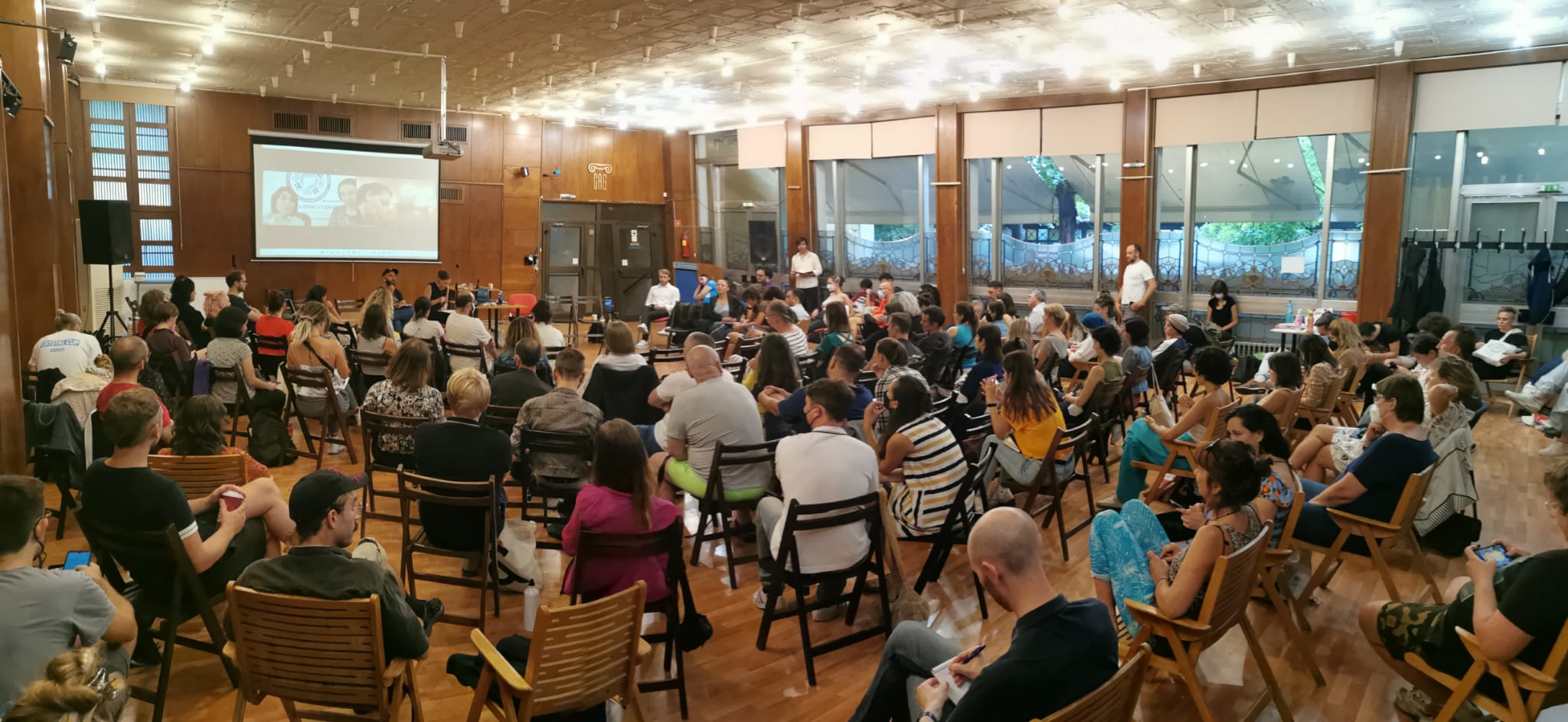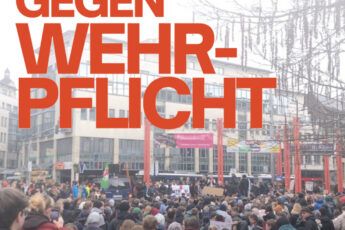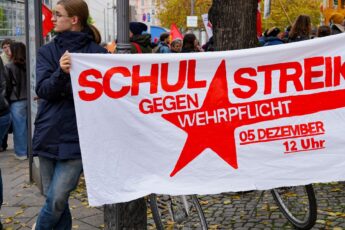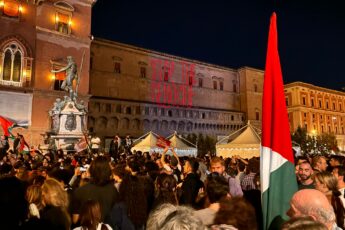
by TSS PLATFORM
[Link below to the workshops’ reports]
On September 8th-11th, 150 participants from nearly 20 different countries (Azerbaijan, Bulgaria, Germany, Portugal, France, Belgium, Austria, Italy, Ukraine, Slovenia, Greece, Turkey, Sweden, Russia, Romania, Serbia, UK, Canada, US, Hungary) met in Sofia, Bulgaria for a convergence hosted by the TSS Platform in collaboration with the Bulgarian feminist organization LevFem.
Workers and union organizers, feminists and LGBTQI+ activists, migrants and solidarity initiatives, strike solidarity groups, ecologist collectives, housing rights groups, anti-war militants, and members of the networks from E.A.S.T. (Eastern Autonomous Struggles Transnational), Transnational Migrants Coordination (TMC) and the Permanent Assembly Against the War (PAAW) came to discuss, debate and co-ordinate on the present political conjuncture.
This gathering represented a wider interest far beyond those present as many more people couldn’t join us, because of visa restrictions or because they needed to work or have children to take care of, and even a few days far from home are unaffordable. We know the stakes are high. With this statement, we attempt to capture the significance we feel was achieved during the days of the meeting and set up a direction for further initiatives.
OUR URGENT CONTEXT
This meeting came amid an escalating war, and while we are facing a devastating crisis in the ability to reproduce ourselves under the constraints on life placed by capital; the rises in the ‘costs’ of living, falling wages, a patriarchal surge, and the ever greater climate crisis – one thing is clear – the desire to meet and exchange across movements from many different locations and political realities reveals the shared urgency to act.
The TSS Platform as a political infrastructure has attempted to provide for many years this possibility to share and overcome the deadlocks of localized and national politics. The challenges of reconciling all our differences and inequalities between states, rights, wages, roles, residence status, nationalities, reproductive and affective/care concerns, histories and levels of safety — once again presented the absolute need to align our strategies for confronting the global division of labour in the first instance.
We didn’t meet in Sofia by chance, but because as TSS we have acknowledged since the first meeting in Poznan in 2015, that Eastern Europe is a crucial space for tackling the changes in production and social reproduction that are transforming the reality and conditions everywhere, even though with different paces. This does not mean that we are all in the same boat, far from it. Connecting issues in order to identify viable, militant steps forward — in coordination with each other — does not mean that differences and inequalities are overlooked. On the contrary. It is the very fact that these differences keep serving capital accumulation, growth of profit, the production of ever-greater crises, the manufacturing and use of weapons, and the competitive race for resources — we find this type of meeting and attempt to collaborate transnationally so indispensable.
Looking at the transnational reality from Sofia means recognizing the centrality of Eastern Europe in the crisis of social reproduction that is shaking eastern societies for the past decades and from the experience of exploitation and oppression of those thousands of migrant women doing the essential labour that supports the welfare in the West. Seeing this from the Eastern European region means condemning the patronizing attitude of the EU, eager to civilize post-socialist countries and careful to implement reform from above whilst not raising expectations above a bare minimum.
The Eastern European space is now the stage of a war of aggression that has the appearance of descending into a Third World War whose effects reverberate across the globe. Despite the evidently urgent need for global coordination — to confront climate change, food crisis, and a whole host of approaching pandemic conditions — we see that chauvinistic nationalism is presented as common sense again in nearly every ideological register. We need to face up to what is unravelling before our eyes.
Besides deaths and destruction in Ukraine, the ongoing global realignment includes open threats of nuclear escalation that threatens our collective future. The so-called partial mobilization in Russia, the repression of women who refuse to be ‘patriotic’ mothers, the persecution of men who desert from the army, and the attack on LGBTQI+ people’s existence, are regarded as a threat to the gendered roles required by the war. The destabilizations in Central Asia, the bombing of important infrastructure, ravaging economic sanctions, the growing politicization of mobility, and the building of even bigger contrasts between US and China are the background where these threats are floated. These threats and the risky politics of war around them are an alarm bell that rings for us all: to reclaim the future, we need to face the new reality shaped by a war with potentially no limits.
REIMAGINING AN ANTI-WAR MOVEMENT ROOTED IN MATERIAL CONDITIONS
This urgency is what the Permanent Assembly Against the War in its Manifesto calls a ‘transnational politics of peace’. The plenary promoted by the PAAW in Sofia has been a liberating moment for most of us as much as it was an emotional one. We can’t hide the tensions, anxieties and fractures that the war is creating. But as one comrade said, discussing together empowers our political imagination and capacity to strike the war. This includes acknowledging that the war is having different impacts on places and people while it affects all and that the war intervenes in a reality already marked by the crisis in social reproduction, rising prices and the climate crisis. The newness of the situation could be recognized in how the global market is not only influenced by acts of war, but that war is now also the outspoken excuse for every new attack on the working class globally. When war is explicitly the official justification for policy in every country, the ramifications of these policies are in turn part of the war and within seconds dictate access to food, energy and safety, locally or on the other side of the world. The shift from covert imperialist violence to triumphalist war rhetoric does influence the political field we are fighting on. We need to relate our initiative of transnational opposition to exploitation and class domination to this new context.
This urgent task pushes us to reimagine what an anti-war movement might look like: not simply as an opposition to the war as such, but the significance of its material effects. What we cannot accept is to be silent on the effects of this war, nor can we accept the ongoing escalation. Even if the war in Ukraine is a difficult argument for most of us to have a position on, we engage with the most uncomfortable situations instead of avoiding troubling discussions. This is what we did in Sofia and what we are committed to doing in the future. Our capacity to intervene in the present is predicated on this, here and now.
This also concerns the current crisis on the cost of living, with growing inflation and the energy crisis that is producing hikes in bills across Europe. From the UK to Germany to Poland to Hungary, we see how conservatives, nationalists and racists are promoting exclusionary campaigns against the cost of living, the war, and economic sanctions in the name of the nation, where ‘nationals first’ become the name of a race to the bottom, racism becomes compensation for impoverishment and the reinforcement of patriarchal values the balancing for the loss of power and livelihoods. Others recognize in Russia a viable alternative to Western neoliberal capitalism and refuse to pay with their wages the consequences of sanctions. We have a difficult task in front of us in the next months: we need to make a transnational perspective tangible and empower moments of refusal, while stubbornly closing the path to nationalistic ‘solutions’ out of the crisis.
Turning away from the nationalism of state politics does not mean that we turn to the EU as the solution. As the discussions in Sofia have shown extensively, European institutions have played a major role in shaping a transnational labour market where different conditions among member countries and labour mobility along transnational channels have fueled economic growth, with the concentration of wealth towards big companies and financial capital. The promised economic reform in Ukraine in return for military and financial support and the readiness to ‘die for Europe’, at the point of further cutting workers’ rights, paves the way for a new round of savage exploitation and accumulation of resources by private capitals and shows the core of what is really meant by ‘European values’.
This includes remarking how mobility has become a crucial field where instances of freedom clashes with capital’s imperatives for exploitation and the reinforcement of authoritarianism. The violence unleashed along borders and migrants’ journeys as well in cities and working places, where migrant labor’s reproduction is conditioned by institutional racism, is part and parcel of the definition of power relations that concerns us all well beyond matters of solidarity. If we do not face up this challenge then the authoritarian, patriarchal and technocratic governance of the crisis will.
STRIKING SOCIAL REPRODUCTION, BUILDING A TRANSNATIONAL POLITICS OF PEACE
The war has accelerated previous crises such as the one in social reproduction that became a crucial field of struggles for women and LGBTQI people in the past years. These struggles made visible the conditions in which the labor performed mostly by women and migrants in essential sectors – healthcare, domestic services, logistics, agriculture, and cleaning – was keeping society afloat during the pandemic, but was devalued and underpaid or unpaid. Now the rise of patriarchal violence, materially and symbolically unleashed by war, is linked with a stricter sexist division of labour well beyond the war zones. However, experiences such as the Feminist Antiwar resistance in Russia and the women-led revolt in Iran show that struggles have not stopped and are resonating a refusal of patriarchal violence, militarization, religious fundamentalism, racism and oppression. One of the question in front of us is therefore how to reactivate the feminist strike in the face of the emerging struggles in social reproduction and shrinking spaces for feminist collective organizing, by making social reproduction at the core of all our struggles and looking towards the 25th of November against patriarchal violence and March 8th.
From the angle of social reproduction we also look at the climate crisis that has been accelerated by the war, all the more as European governments are declaring that we are in the middle of an “energy war”. What the war is doing is making evident that the so-called ‘green transition’ is nothing less than a new cycle of accumulation. Its goal is not to tackle the climate crisis, but to form new global alignments of supply chains for the pursuit of profits. While the war is increasing pollution at an enormous scale, the climate emergency has been forgotten and the energy transition is now explicitly part of the struggle to reshape the global order. While this happens, we must prepare to struggle on the different terrains involved in the climate crisis: against its consequences and on the side of the subjects that are more affected, starting from claiming freedom of movement for all migrants, including those fleeing regions of the globe hit by disruptive climate events; by refusing to buy transition in the name of the war. This is another of the lines of divisions that we need to tackle in the next months: the one that supposedly divides workers into different sectors and pits one against the other, between workers and those fighting for climate justice. The climate class conflicts to come cannot but be untamable in striking the real culprits behind this war which has been declared against our future.
We see that ongoing responses are already on the way. From Russia to Iran to Turkey, women are struggling against patriarchal politics, exacerbated by the war situation and the global instability that requires ranks to be closed and hierarchies to be respected. The Don’t Pay Campaign launched in the UK is mobilizing thousands of people and contending political spaces with reactionary movements, raising attention internationally. From a country devastated by decades of privatizations and cuts in wages and welfare comes a strong sign that striking and saying no is possible. This does not mean that such a campaign can be simply copy-pasted in different places. We need to build a wider collective power where individual behaviours can resonate as part of a common strategy. We need to be ready when governments will give their own solutions to the energy crisis by increasing financial support to the wealthiest classes, or by justifying it as part of a ‘war effort’ or by producing interventions that will further divide working-class people along national lines, as we are seeing in the UK and Germany.
In the following months, we will keep working on different terrains – the crisis in social reproduction, wages and costs of living, and the climate crisis, within the context of the Third World War – that can be tackled together. We will work to bridge acts of refusal to form a transnational movement. Where the refusal to be hungry or cold this winter goes together with the refusal of enlisting for the state or the nation, the refusal of paying the price – economic, social and political – of a never-ending war, the refusal of buying the neoliberal green transition as the solution to an impending climate crisis, the refusal of the hierarchies and divisions that make social reproduction a field of war instead of collective struggle.
The task is tough: we need to turn refusals, anger and confusion into the capacity to strike together transnationally. We need once again to rethink what a transnational social strike can look like in these new conditions. Given this urgency, we will support the growth of the different but interconnected political spaces that met in Sofia, starting from the PAAW, and we won’t wait long to meet again in person: we will organize a transnational meeting in Germany in January 2023 and we call everyone that wants to contribute to the growth of a transnational movement to stay tuned or contact us in the following weeks.
Workshops’ report:
Migrant Struggles against Exploitation, Racism and Patriarchal Violence in the War Context (Transnational Migrants Coordination)
Turning Social Reproduction Upside Down (E.A.S.T.)
EU Enlargement: Wage Politics and Transnational Workers’ Organization





